In February we hosted the Julia Anderson Training Programme (JATP) Careers Event 2024 at Institute of Global Health Innovation (IGHI), a fantastic evening for sixth form students to learn more about our Julia Anderson programme and the IGHI, and get inspired for their future careers.
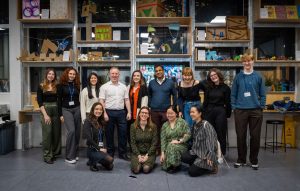
Sixth formers from different London state-funded schools travelled to The Invention Rooms, at Imperial College London’s White City Campus, to participate in the event. They got the chance to learn more about the opportunities at IGHI, hear some of our staff members’ career journeys, as well as interact with some of the fantastic workstreams we work on to improve people’s health.
About the Julia Anderson Programme and next cohort recruitment
The evening started with Sophie Pieters, IGHI Operations Officer and JATP Programme Lead, welcoming the attendees and introducing the JATP programme, including the eligibility criteria and the new trainee roles available in the summer.
The Julia Anderson Training Programme gives people with limited or no work experience the opportunity to join an impactful stream of work at IGHI, Imperial College London’s. The paid programme gives trainees the opportunity to grow their network, boost their CV and develop applicable workplace skills and knowledge.
Sophie announced the three upcoming roles for the next cohort in July, specifically Analytics and Events Trainee, Public Involvement Trainee and Educational Research Trainee (the first two are open to those with no university). On 14 March, a webinar will be held to provide people with more information on the programme, the training positions on offer and useful advice for the application. Students were highly encouraged to sign up for the webinar.
Career talks from IGHI staff and trainees
Next, some of the IGHI staff and current trainees delivered individual presentations highlighting their career journey, challenges, and other valuable insights from their experience.
“I found the job I loved although didn’t know it existed. It’s okay if you don’t know what you want to do.’’, said Eleni Daniels, Patient Safety Research Centre (PSTRC) Manager at IGHI, who has a background in biomedical sciences and worked in advertising before finding her dream job in a patient safety field.
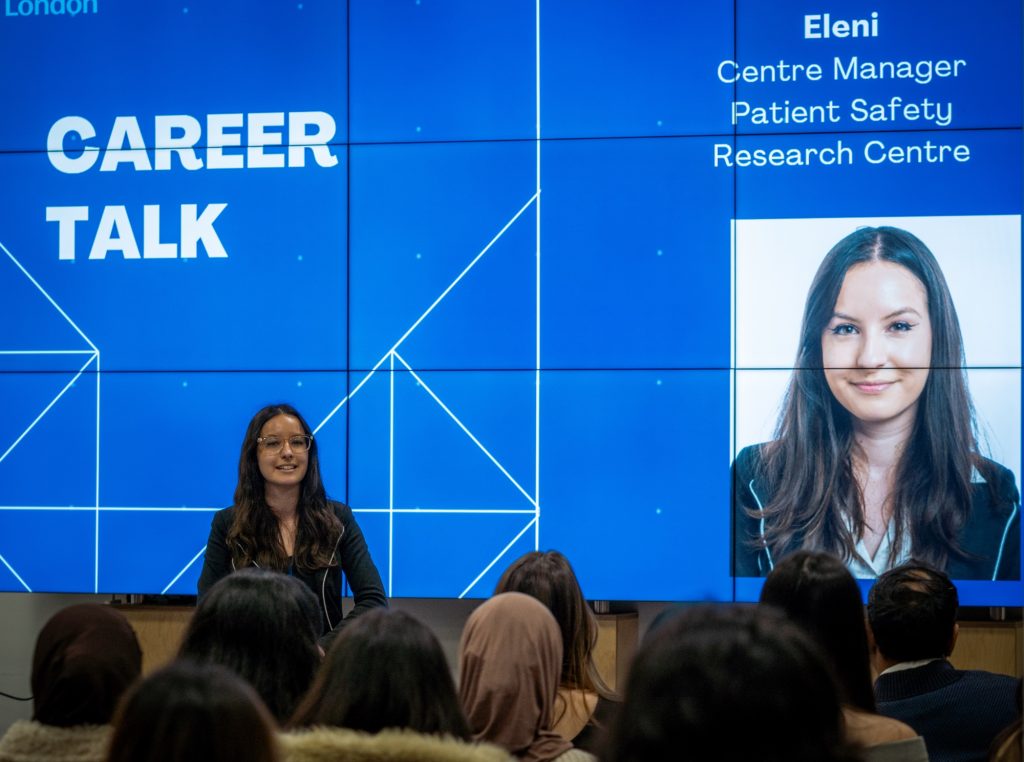
Amish Acharya, Scientific Advisor to Professor Ara Darzi at IGHI, talked about his ‘unconventional’ career path from medicine, followed by PhD in Behavioural Science, to his current role, where he is contributing to creating research projects and supporting the progress of scientific work. Amish advised:
“Exams don’t represent who you are and what you can do. It’s never too late to change your path, don’t be afraid to try different things – this can often make you more adaptable and rounded as a person.’’
One of our current Julia Anderson Trainees, Tania Domun, a graduate of Population Health and Medical Sciences with a Master’s degree in Public Health, shared her experience so far as a JATP trainee in Behavioural Science and the benefits of joining the programme:
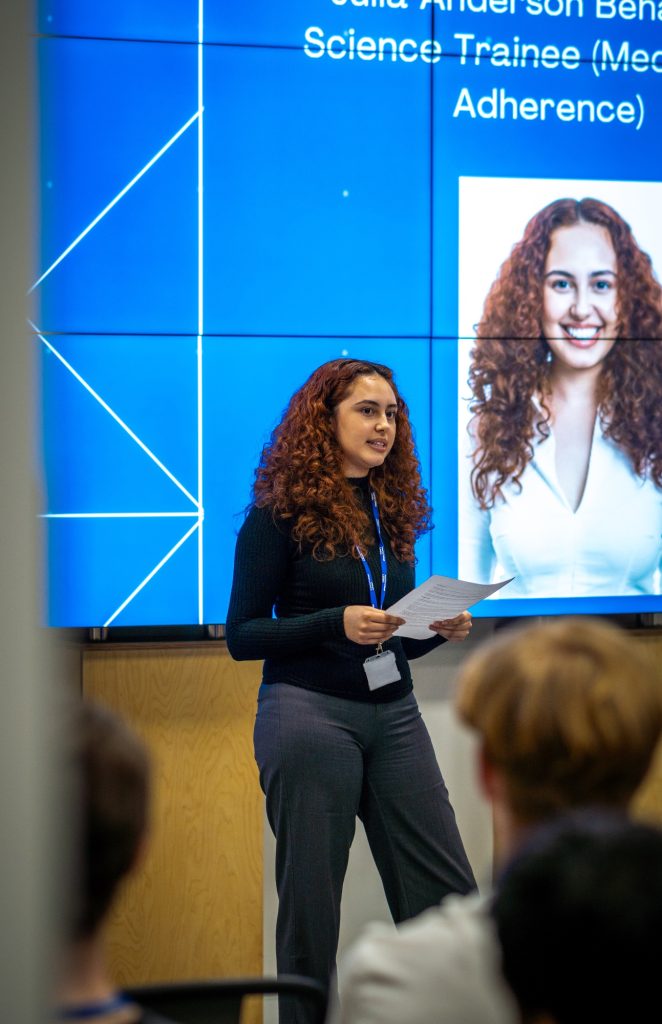
a current JATP trainee. Credits: Rolando Charles
“JATP allows you to develop your skills and support you with the next steps in your career. It’s challenging when you don’t have a mentor or people to help you navigate your professional path. The programme does exactly that, by focusing on you as an individual. It’s a lot about your passions and not your previous work experience. This makes it a unique programme.’’
She also talked about the Imposter syndrome: ‘’I’ve realised many people, including me, deal with this syndrome – don’t let these feelings stop you from applying for the programme. This is the best time to explore possibilities and build new skills.’’
Lastly, Clarissa Gardner, Senior Design Researcher at TPXimpact and Honorary Research Fellow, spoke about her career journey as a ‘learning process’ and how she came about setting the JATP programme, after doing a MSc in Health and Design at IGHI:
‘‘Your job title doesn’t matter as much as your ability to help others and inspire positive change. I recognised the diversity of people at IGHI, so I proposed this programme to create work experiences for people.’’
Interactive activities showcasing IGHI Centres’ work
After these inspiring talks, we organised interactive activities led by each of the IGHI Centres. During these sessions, attendees had the opportunity to engage with the different workstreams at IGHI in small groups and interact with IGHI staff members.
The Hamlyn centre hosted a ‘create your own surgical robot’ activity. Sixth formers were challenged to conceptualise the design of a robot, then turn their drawings into 3D images using specialised software. Hamlyn centre representatives also explained the benefits of surgeons using surgical robots compared to traditional surgery methods, highlighting how they enhance precision during procedures. The participating team included Brandon Davies, Learning Technologist, Nazia Bharde, Project Officer, Robert Merrifield, Medical Design Associate and Salzitsa Anastasova-Ivanova, Facilities Manager.
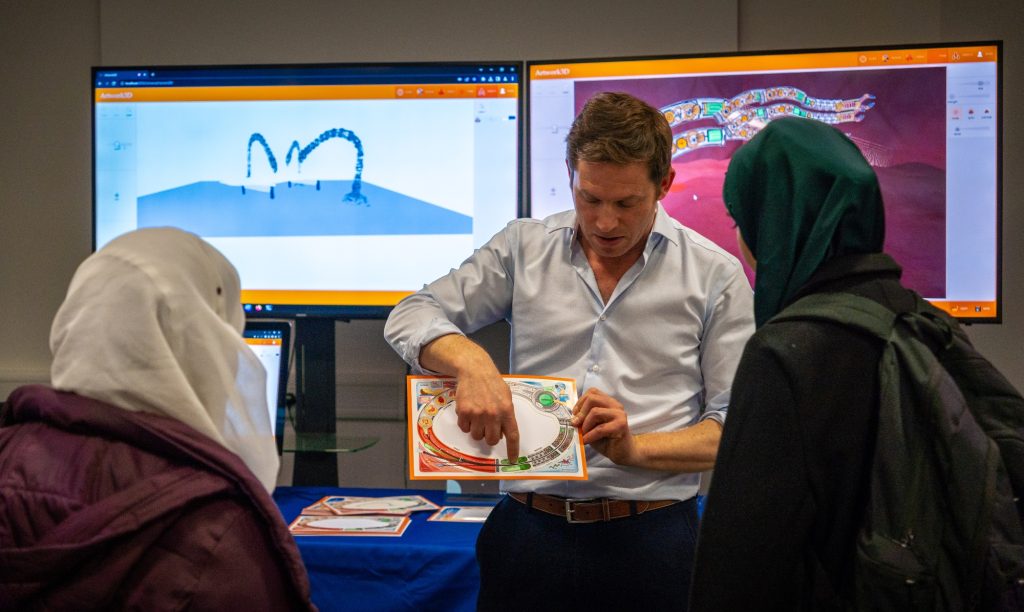
At one of the Helix Centre stands led by Jodie Chan, Patient and Public Involvement and Engagement Officer, and Clare McCrudden, Policy Fellow from the Change Lab, students had the opportunity to discover how the public can influence research priorities, methodologies, and dissemination for healthcare improvement. They were encouraged to brainstorm alternative names for ‘antimicrobial resistance’ and open the ‘can of worms’ around healthcare data through an interactive activity, sparking further discussions on its benefits and risks.
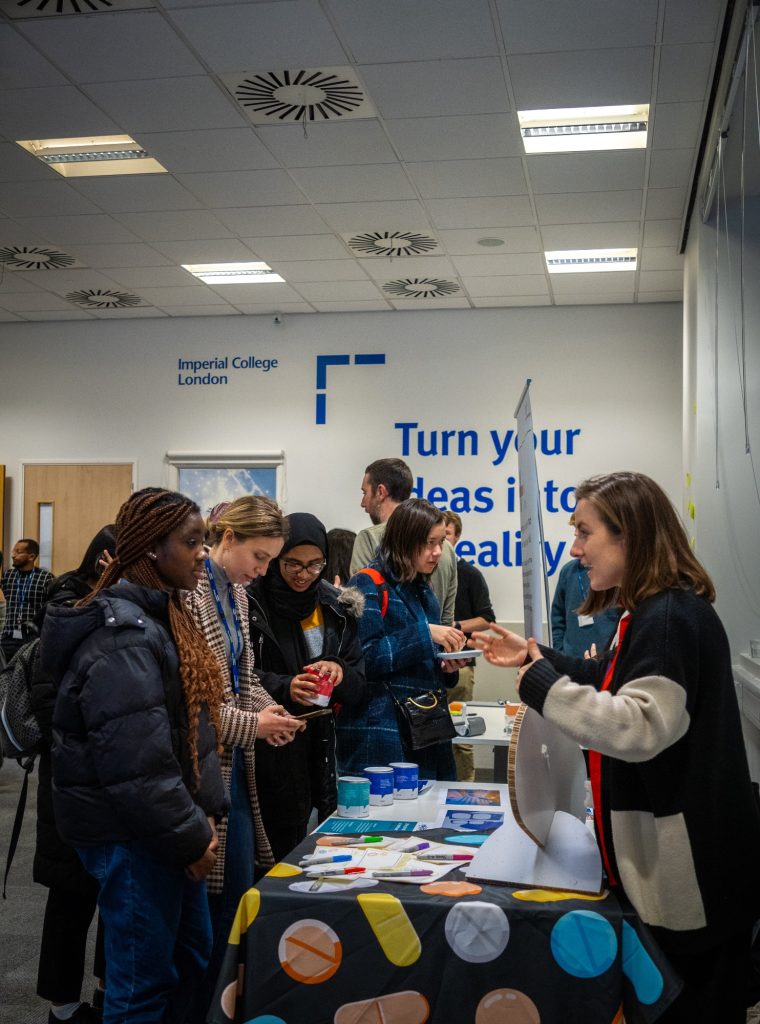
resistance with sixth formers. Credits: Rolando Charles
They also learned about one of the upcoming JATP roles – Public Involvement Trainee – who will help to involve local youth groups and schools in a project aimed at better understanding the mental health needs of children across the UK and identifying how services can better support them.
The second Helix Centre stand was led by Matthew Harrison, Senior Design Associate, Alex Dallman-Porter, Designer Healthcare Products, and current JATP trainee, Andrew Watt. People were invited to participate in a grip strength assessment activity, during which they were asked to squeeze a ball-shaped dynamometer (‘squegg’) in their hand to measure their frailty levels and compare with their peers. Additionally, the stand showcased a sleeping mat used for measuring heart rate and respiratory rate, along with other environmental sensors designed for individuals with dementia.
Jessica Newberry Le Vay, Climate Change and Health Policy Fellow at the Climate Cares Centre, hosted an interactive session about exploring climate emotions and imagining what future they want to see. The students were challenged to think about the following questions: ‘’How does climate change make you feel?, What stories do you hear about the future?, What would you want the future to look like?’’
People were able to discuss their responses to these questions and see what other people have put. They explored actions that can improve both mental health and the climate, building hopeful and constructive narratives around climate change.
Eleni Daniels from PSRC also had a stand on patient journey. She encouraged students to reflect on healthcare experiences of themselves, their family members, or friends, and to consider how these experiences could be further improved. People shared their thoughts and experiences, engaging in a dialogue that allowed them to open up and explore patient journeys from the GP to hospital settings.
Feedback from sixth formers
We were impressed by the amount of positive feedback we received from the sixth formers. Some examples below:
“I’ve discovered that you don’t need to know exactly what you want to do at this age. It’s more important to be open to learning and taking on new opportunities and experiences.”
“Many internships and training programmes require individuals to meet specific minimum requirements. It’s fantastic to discover that the JATP program doesn’t have such requirements, giving people the chance to gain those skills and build experience.”
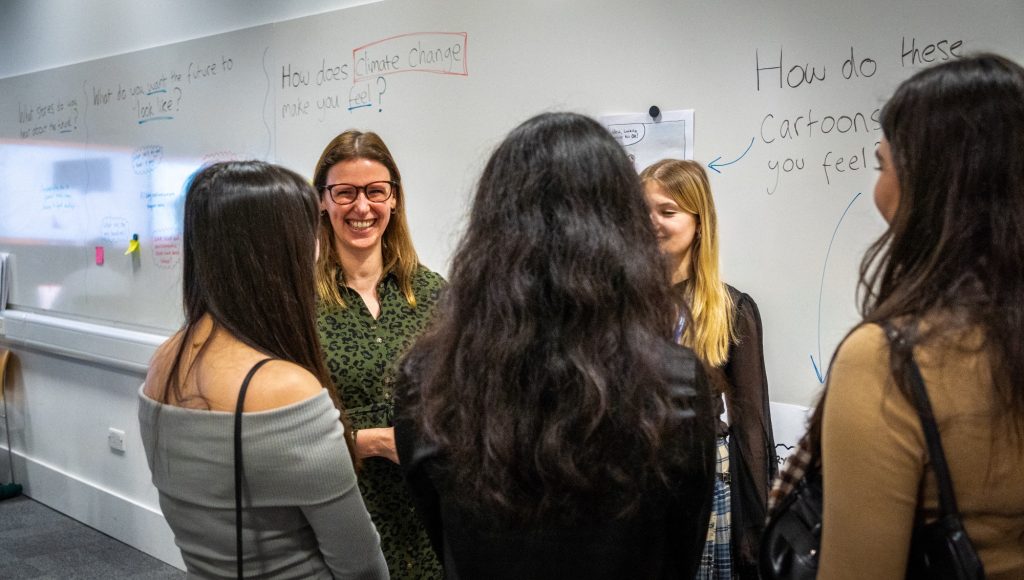
“I found the event very engaging and fun. It made me think about my future career, the steps I want to take next and the sort of support I should be seeking. I am keen to apply for this programme!’’
On the day feedback indicated that, among our participants, 90% were inspired for their career after attending the event. According to our post-event online survey, 92% of our participants expressed their willingness to recommend JATP to a friend, while 83% of respondents indicated their intention to apply for JATP in the future.
We are looking forward to seeing people applying for the JATP programme and taking advantage of the tremendous opportunities at IGHI to advance in their careers. The event was made possible by the EDI Seed Fund and we are very grateful for their support.